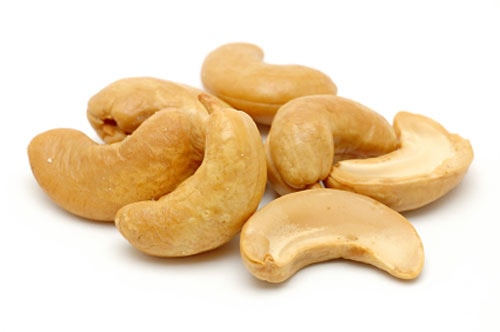
Written By: Sofia Layarda, MPH
Title: Master of Public Health
Alumni: University of California, Berkeley
Last Updated on:

Ever been curious about cashews? These golden kidney-shaped nuts have a slightly sweet flavor and rich, buttery texture. They appear frequently in Southeast Asian and South Asian cuisines. Originally from Brazil, cashews are grown in tropical climates. While we in North America are more familiar with the cashew nut, the fruit of the tree (called cashew apple) is also edible but does not transport well due to its fragile flesh.
It is rare to find cashews in-shell because the shell of the nut contains a toxic substance that can irritate our skin (it is related to poison ivy). If you happen to find unshelled cashews in store, don’t worry; they have most likely undergone a commercial roasting process that removes this toxic resin.
Table of Contents
1 oz of dry-roasted unsalted cashews (approximately 15 nuts) contains:

Collectively, nuts are a great source of protein, fiber, phytonutrients, antioxidants, and heart-friendly unsaturated fats. What makes cashews unique is that for a given serving, they contain less total fat and more saturated fat than other nuts. Cashews are good source of copper, a nutrient involved in antioxidant activity within the body, as well as maintenance of healthy skin, hair, and connective tissue. They also contain magnesium, which plays an important role in bone and cardiovascular health.
While roasting nuts tends to improve their flavor, Canadian researchers have found that it also increases the antioxidant activity in cashews, according to a May 2011 article in the Journal of Agricultural and Food Chemistry.
If you buy cashews, get them from a store that has a good turnover to ensure you have access to a fresh supply. If buying in the bulk section, do a little sniff to ensure the nuts have not gone rancid. Choose the unsalted variety when possible (whether raw or roasted) to give yourself control over how much sodium is in the product, and skip sweetened varieties, which come with excess empty calories and/or other additives.
Alumni: University of California, Berkeley – Sofia believes in bringing back fun and pleasure into everyday eating. She loves cooking, and is constantly experimenting with ingredients, creating recipes and trying them out on family and friends. Her latest interest lies in finding realistic and practical ways of environmentally-friendly food/eating habits.
antioxidant, cashews, grocery aisle, healthy every month, nuts